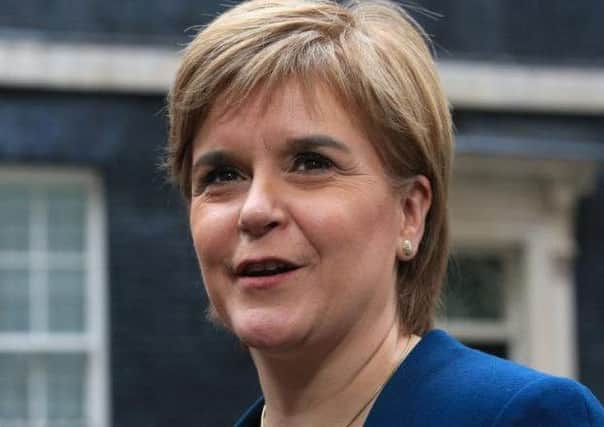May rules out Scottish Brexit deal and calls for UK-wide support


In a major speech on her priorities for negotiations with Brussels, the Prime Minister said the UK’s Brexit settlement would not include any “internal barriers” to trade.
The comments underline Downing Street’s insistence that the whole UK will leave the EU, and rules out continued membership of the single market for Scotland as proposed by Nicola Sturgeon.
Advertisement
Hide AdAdvertisement
Hide AdIt would make any devolution of immigration or international trade powers impossible, rejecting key demands by the Scottish Government to avoid a second independence referendum.
The First Minister has repeatedly said that a second independence vote would be “on the table” in the event of a ‘hard Brexit’ that takes the UK out of the EU single market and customs union.
Setting out her vision for Brexit, Ms May said she would “put the preservation of our precious Union at the heart of everything we do.
“Because it is only by coming together as one great union of nations and people that we can make the most of the opportunities ahead.”
Promising a “stronger Britain” with a re-enforced Union as one of her twelve priorities, she continued: “At this momentous time, it is more important than ever that we face the future together, united by what makes us strong: the bonds that unite us as a people, and our shared interest in the UK being an open, successful trading nation in the future.”
Mrs May welcomed the Scottish Government’s paper setting out its position on Brexit, but she made clear the substance of the deal with the EU would be a matter for the UK Government and parliament.
“Foreign affairs are of course the responsibility of the UK Government, and in dealing with them we act in the interests of all parts of the United Kingdom,” she said.
“We won’t agree on everything, but I look forward to working with the administrations in Scotland, Wales and Northern Ireland to deliver a Brexit that works for the whole of the United Kingdom.
Advertisement
Hide AdAdvertisement
Hide Ad“Part of that will mean working very carefully to ensure that – as powers are repatriated from Brussels back to Britain – the right powers are returned to Westminster, and the right powers are passed to the devolved administrations of Scotland, Wales and Northern Ireland.
“As we do so, our guiding principle must be to ensure that - as we leave the European Union - no new barriers to living and doing business within our own Union are created,
“That means maintaining the necessary common standards and frameworks for our own domestic market, empowering the UK as an open, trading nation to strike the best trade deals around the world, and protecting the common resources of our islands.”
But she pledged: “As we do this, I should equally be clear that no decisions currently taken by the devolved administrations will be removed from them.”
The Prime Minister concluded by saying that an “essential ingredient of our success” would be “the strength and support of 65 million people willing us to make it happen”.
She said: “The referendum was divisive at times. And those divisions have taken time to heal.
“But one of the reasons that Britain’s democracy has been such a success for so many years is that the strength of our identity as one nation, the respect we show to one another as fellow citizens, and the importance we attach to our institutions means that when a vote has been held we all respect the result.
“The victors have the responsibility to act magnanimously. The losers have the responsibility to respect the legitimacy of the outcome. And the country comes together.”